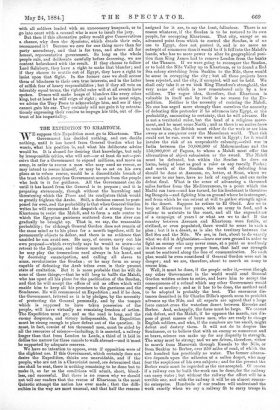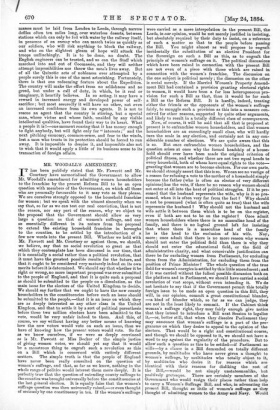THE EXPEDITION TO KHARTOUM.
WE suppose this Expedition must go to Khartoum. The Government has decided nothing, and can decide nothing, until it has heard from General Gordon what he wants, what his position is, and what his deliberate advice would be. It is abused for desiring that knowledge, but only by irresponsible critics, who will not—or at least do not--per- ceive that for a Government to expend millions, and move an army, in order to rescue a man who may need no rescue, or may intend to rescue himself, or may be so set on his own plans at to refuse rescue, would be a discreditable breach of the trust which every free Government accepts from the people who look to it for guidance. All the. Government can do until it has heard from the General is to prepare ; and it is preparing strenuously, though without the hurrahing and threatening which the Times and its coadjutors think would so greatly frighten the Arabs. Still, a decision cannot be post- poned for ever, and the probability is that when General Gordon writes he will recommend the despatch of a strong force to Khartoum to resist the Mandi, and to form a safe centre to which the Egyptian garrisons scattered down the river can gradually be brought up. That is, we say, the reasonable probability ; for although General Gordon does not remain of the same mind as to his plans for a month together, still he permanently objects to defeat., and there is no evidence that unaided he can avoid one. He may, of course, carry out his own proposal—which everybody says he would so scorn—to retreat to the Equator, and thence march to the Congo; or he may play the tremendous card always in his hand, and by decreeing emancipation, and calling all slaves to arms, revolutionise the Soudan ; or he may form an army capable of defeating the Arab tribes even in their present state of exaltation. But it is more probable that he will do none of these things,—that he will long to baffle the Mandi, who has upset all his plans for the pacification of the Soudan, and that he will accept the offers of aid as offers which will enable him to keep all his promises to the garrisons and the Soudanese. He will recommend an Expedition ; and if he does, the Government, fettered as it is by pledges, by the necessity of protecting the General personally, and by the temper which is supposed to have taken possession of the people, will have virtually no remaining freedom of action. The Expedition must go ; and as the road is long, and the enemy desperate, and victory indispensable, the Expedition must be strong enough to place defeat out of the question. It must, in fact, consist of ten thousand men, must be aided by all the resources of science—including, it is asserted, a railway longer than that from London to Leeds, a third of it laid in defiles too narrow for three camels to walk abreast—and it-must be supported by adequate reserves.
We have no intention to oppose, even if opposition were of the slightest use. If this Government, which certainly does not desire the Expedition, thinks one unavoidable, and if the people, who are not in a Chauvinist mood, are determined that one shall be sent, there is nothing remaining to be done but to make it, so far as the conditions will admit, short, blood- less, and successful. But there is no reason why we should not tell our readers that the rescue of Khartoum is the most Quixotic attempt the nation has ever made ; that the diffi- culties in the way are most unusual, and that half the reasons assigned for it are, to say the least, fallacious. There is no reason whatever, if the Soudan is to be restored to its own people, for occupying Khartoum. That city, except as an advanced point from which to control the Soudan, is of no use to Egypt, does not protect it, and is no more an entrepot of commerce than it would be if it fell into the Mandi'a hands, who has no more power to alter its geographical posi- tion than King James had to remove London from the banks of the Thames. If we were going to reconquer the Soudan, or to hold the Nile Valley up to Khartoum, or to found a Red Sea colony stretching from Suakim to the Nile, there would be sense in occupying the city ; but all these projects have been rejected, and the city, if occupied, will not be held. We shall only take it as we took King Theodore's stronghold, the very name of which is now remembered only by a few soldiers. The vague idea, therefore, that Khartoum is valuable in itself and by itself is no reason for the Ex- pedition. Neither is the necessity of resisting the Mandi. No one has urged more strongly than ourselves the necessity of defeating this pretender if he advances into Egypt, or the probability, amounting to certainty, that he will advance. He is not a territorial ruler, but the head of a religious move- ment, and he must come North ; and as there is no native force to resist him, the British must either do the work or see him sweep as a conqueror over the Mussulman world. That risk could not be run, even if we were not in Egypt ; for it would involve the risk of an unspeakable calamity,—civil war in India between the 70,000,000 of Mahommedans and the 150,000,000 of Pagans, to whom a Mandi must offer the alternatives of abject submission or the sword. The Mandi must be defeated, but within the Soudan he does no harm, being at least as good a ruler as any rascally Pasha ; and north of the Soudan the work of defeating him should be done at Assouan, or, better, at Siout, where we are near to our base, have no lack of supplies, and can make defeat final. What is the sense of advancing a thousand miles further from the Mediterranean, to a point which the Mandi can turn—and has turned, for his lieutenant is threaten- ing Dongola —and fighting him on ground where he is strongest, and from which he can retreat at will to gather strength again in the desert. Suppose he retires to El Obeid. Are we to keep at Khartoum for years, with an army to feed, and a railway to maintain to the coast, and all the expenditure of a campaign of years ? or what are we to do V If the country between Assouan and Khartoum were fertile, or civilised, or even populated, there would be sense in such a plan ; but it is a desert, as is also the territory between the Red Sea and the Nile. We are, in fact, about to do exactly what we did in Afghanistan—leave our own ground in order to fight an enemy who may never come, at a point so needlessly in advance of our own proper base, that half our strength must be scattered along the line of communication. No such plan would be even considered if General Gordon were not in danger ; and we are, therefore, about to march an army to rescue him.
Well, it must be done, if the people order it,—even though any other Government in the world would send General Gordon written orders to retire, and leave him to accept the consequences of a refusal which any other Government would regard as mutiny ; and as it has to be done, the method said to be adopted is probably the best. The enormous dis- tances described in Sir Charles Dilke's speech seem to prohibit advance up the Nile, and all experts are agreed that a large force cannot cross the waterless desert between Korosko and Berber. And, unhappily, the force must be large. We cannot risk defeat, and the Mandi, if he opposes the march, can dis- pose of great masses of brave men, who are ready to charge English soldiers, and who, if the numbers are too small, might defeat and destroy them. It will not do to despise the Soudanese, or to believe that with an enemy so numerous and so brave, science can make up for any disparity in strength. The army must be strong; and we are driven, therefore, either to march from Massowah through Kassala to the Nile, or from Suakim to Berber, over 250 miles of road, of which the last hundred has practically no water. The former alterna- tive depends upon the adhesion of a sullen despot, who may fear the suspicions of his own subjects ; and for the present the Berber route must be regarded as the one accepted. Of course if a railway can be built the work can be done, for the railway can carry water ; but without the railway the effort will be a terrible ono, and with the railway it will be an almost roman- tic enterprise. Hundreds of our readers will understand the work exactly when we say a railway fit to carry troops in
masses must be laid from London to Leeds, through narrow defiles often ten miles long, over waterless deserts, between stations which can only be fed with water by the railway itself, in presence of an enemy who can march twice as quickly as our soldiers, who will risk anything to block the railway, and who on the slightest gleam of hope will attack the troops unflinchingly. It is to be done, no doubt. The English engineers can be trusted, and so can the Staff which marched into and out of Coomassie, and they will neither attempt impossibilities nor throw the men's lives away. But of all the Quixotic acts of nobleness ever attempted by a people surely this is one of the most astonishing. Fortunately, there is that one redeeming feature about the Expedition. The country will make the effort from no selfishness and no greed, but under a call of duty, in which, be it real or imaginary, it heartily believes. In so acting, it may have a reward in increased energy and developed power of self- sacrifice ; but most assuredly it will have no other, not even an increased confidence from its own agents. It is not to rescue an agent that the country is stirring, but a special man, whose virtue and whose faith, unaided by any visible intellectual qualities, have found their way to its heart. What a people it is 1—one moment roaring that it has money enough to fight anybody, but will fight only for " interests ;" and the next pitching economy, common-sense, and fear to the winds, lest a man who trusts in its protection should be forced to run away. It is impossible to despise it, and impossible also not to wish that it would apply a little of its business sense to its transaction of foreign affairs.

































 Previous page
Previous page